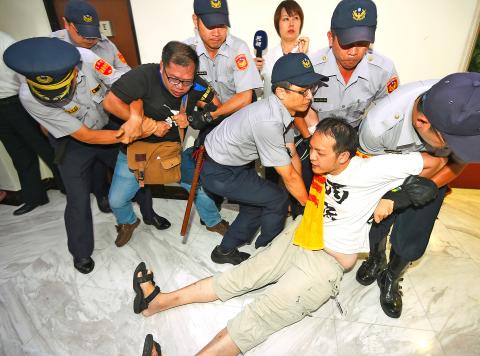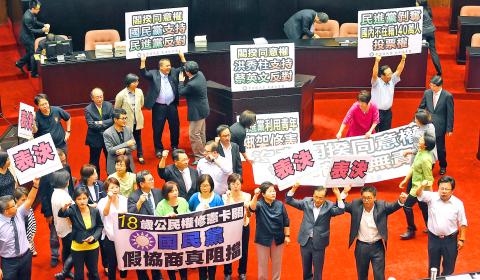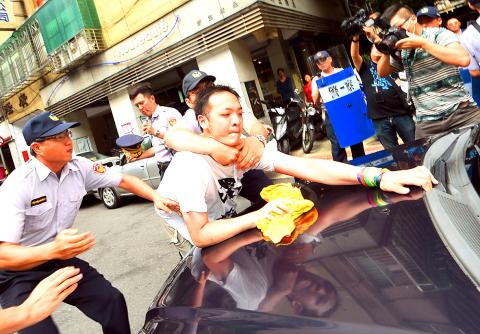Interparty negotiations over constitutional amendments broke down again yesterday, with young protesters, angry over the Chinese Nationalist Party’s (KMT) refusal to separately review controversial amendments on the last day of the legislative session, attempting to storm into KMT caucus whip Lai Shyh-bao’s (賴士葆) office.
The Legislative Yuan had its last plenary meeting yesterday, which was already extended for the legislature to pass the amendments in time for a referendum on the reforms to take place alongside the presidential and legislative elections on Jan. 16. The failure to pass the amendments means the referendum will not take place as planned.
The party caucuses held negotiations yesterday morning intending to iron out the disagreements on how the constitutional amendments should be handled.

Photo: Chang Chia-ming, Taipei Times
The Democratic Progressive Party (DPP) caucus said it proposed that constitutional amendments on which the parties have reached a consensus, such as the lowering of the voting age to 18 and the lowering of the threshold for parties to secure representation in the legislature, be passed in time for the administrative procedures required by the referendum.
It accused the KMT caucus of lacking sincerity with its insistence on bundling amendments for simultaneous legislative passage.
DPP caucus whip Ker Chien-ming (柯建銘) said Lai stressed that it was the KMT leadership pressing for the bundling of the legislature’s power to confirm the premier and absentee voting — the two items that the KMT believes to be the most pressing, but which the DPP opposes — with the lowering of the voting age.

Photo: Chang Chia-ming, Taipei Times
Ker alleged that Lai even proposed a delay to the presidential election — but not the legislative election — which would relieve the pressure for prompt passage of the constitutional amendments, because the referendum, which has to be scheduled on the same day as the elections to guarantee a 50 percent voter turnout for the vote to be valid, could then be postponed to be held with the rescheduled presidential election.
Ker said the KMT, which is likely to nominate Deputy Legislative Speaker Hung Hsiu-chu (洪秀柱) as its presidential candidate, expects a significant challenge for KMT legislative candidates (especially in the south), and that postponing the presidential election — which could allow at least another month for interparty negotiations on the constitutional amendments — would likely reduce Hung’s impact on the legislative election for KMT candidates.
Lai denied proposing the postponement, saying it was put forward by People First Party Legislator Thomas Lee (李桐豪), who, according to Lai, asked DPP Chairperson and presidential candidate Tsai Ing-wen (蔡英文) to promise that she would support allowing the legislature to confirm the premiership.

Photo: Chang Chia-ming, Taipei Times
Lai added that legislative regulations state that bills, unless already having a consensus, could not be put to a vote within one month of negotiations.
A group of young people walked into the building housing legislators’ offices early yesterday afternoon and demanded that Lai answer questions on the issue.
After a standoff with police outside Lai’s office, they were thrown out, with protester Wang Yi-kai (王奕凱) arrested on charges of assault on a police officer.
The protesters demanded to see evidence of Wang’s offense, but said it was not provided.
The police escorted Wang to a patrol car and were able to leave only after a confrontation, in which the protesters blocked the car by lying down in front of it.
DPP Legislator Yu Mei-nu (尤美女) later said that KMT lawmakers failed to appear at an interparty negotiation session scheduled for the afternoon, adding that Lai told her that negotiations were not possible, because of a party leadership directive.
The last general assembly meeting ended at about 6pm, with lawmakers from both parties holding banners and shouting slogans denouncing each other for obstructing the constitutional reforms.

CHAOS: Iranians took to the streets playing celebratory music after reports of Khamenei’s death on Saturday, while mourners also gathered in Tehran yesterday Iranian Supreme Leader Ayatollah Ali Khamenei was killed in a major attack on Iran launched by Israel and the US, throwing the future of the Islamic republic into doubt and raising the risk of regional instability. Iranian state television and the state-run IRNA news agency announced the 86-year-old’s death early yesterday. US President Donald Trump said it gave Iranians their “greatest chance” to “take back” their country. The announcements came after a joint US and Israeli aerial bombardment that targeted Iranian military and governmental sites. Trump said the “heavy and pinpoint bombing” would continue through the week or as long

TRUST: The KMT said it respected the US’ timing and considerations, and hoped it would continue to honor its commitments to helping Taiwan bolster its defenses and deterrence US President Donald Trump is delaying a multibillion-dollar arms sale to Taiwan to ensure his visit to Beijing is successful, a New York Times report said. The weapons sales package has stalled in the US Department of State, the report said, citing US officials it did not identify. The White House has told agencies not to push forward ahead of Trump’s meeting with Chinese President Xi Jinping (習近平), it said. The two last month held a phone call to discuss trade and geopolitical flashpoints ahead of the summit. Xi raised the Taiwan issue and urged the US to handle arms sales to

State-run CPC Corp, Taiwan (CPC, 台灣中油) yesterday said that it had confirmed on Saturday night with its liquefied natural gas (LNG) and crude oil suppliers that shipments are proceeding as scheduled and that domestic supplies remain unaffected. The CPC yesterday announced the gasoline and diesel prices will rise by NT$0.2 and NT$0.4 per liter, respectively, starting Monday, citing Middle East tensions and blizzards in the eastern United States. CPC also iterated it has been reducing the proportion of crude oil imports from the Middle East and diversifying its supply sources in the past few years in response to geopolitical risks, expanding

An Emirates flight from Dubai arrived at Taiwan Taoyuan International Airport yesterday afternoon, the first service of the airline since the US and Israel launched strikes against Iran on Saturday. Flight EK366 took off from the United Arab Emirates (UAE) at 3:51am yesterday and landed at 4:02pm before taxiing to the airport’s D6 gate at Terminal 2 at 4:08pm, data from the airport and FlightAware, a global flight tracking site, showed. Of the 501 passengers on the flight, 275 were Taiwanese, including 96 group tour travelers, the data showed. Tourism Administration Deputy Director-General Huang He-ting (黃荷婷) greeted Taiwanese passengers at the airport and